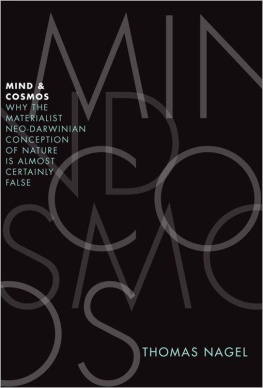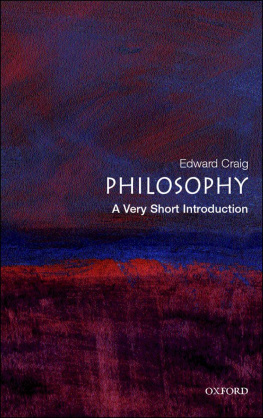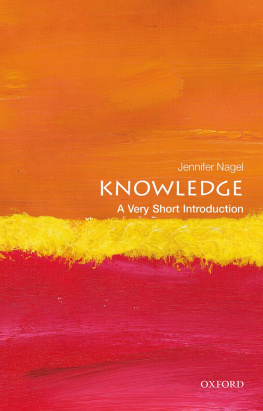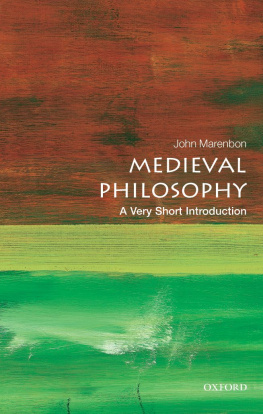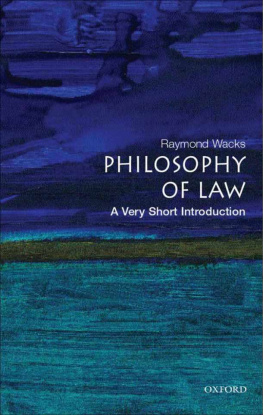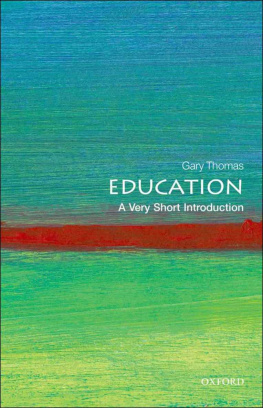Thomas Nagel - What Does It All Mean?: A Very Short Introduction to Philosophy
Here you can read online Thomas Nagel - What Does It All Mean?: A Very Short Introduction to Philosophy full text of the book (entire story) in english for free. Download pdf and epub, get meaning, cover and reviews about this ebook. year: 1987, publisher: Oxford University Press, genre: Religion. Description of the work, (preface) as well as reviews are available. Best literature library LitArk.com created for fans of good reading and offers a wide selection of genres:
Romance novel
Science fiction
Adventure
Detective
Science
History
Home and family
Prose
Art
Politics
Computer
Non-fiction
Religion
Business
Children
Humor
Choose a favorite category and find really read worthwhile books. Enjoy immersion in the world of imagination, feel the emotions of the characters or learn something new for yourself, make an fascinating discovery.

- Book:What Does It All Mean?: A Very Short Introduction to Philosophy
- Author:
- Publisher:Oxford University Press
- Genre:
- Year:1987
- Rating:3 / 5
- Favourites:Add to favourites
- Your mark:
- 60
- 1
- 2
- 3
- 4
- 5
What Does It All Mean?: A Very Short Introduction to Philosophy: summary, description and annotation
We offer to read an annotation, description, summary or preface (depends on what the author of the book "What Does It All Mean?: A Very Short Introduction to Philosophy" wrote himself). If you haven't found the necessary information about the book — write in the comments, we will try to find it.
Thomas Nagel: author's other books
Who wrote What Does It All Mean?: A Very Short Introduction to Philosophy? Find out the surname, the name of the author of the book and a list of all author's works by series.
What Does It All Mean?: A Very Short Introduction to Philosophy — read online for free the complete book (whole text) full work
Below is the text of the book, divided by pages. System saving the place of the last page read, allows you to conveniently read the book "What Does It All Mean?: A Very Short Introduction to Philosophy" online for free, without having to search again every time where you left off. Put a bookmark, and you can go to the page where you finished reading at any time.
Font size:
Interval:
Bookmark:
What Does It All Mean?
By the Same Author
The Possibility of Altruism
Mortal Questions
The View From Nowhere
Equality and Partiality
Other Minds: Critical Essays 1969-1994
The Last Word
A Very Short Introduction to Philosophy
THOMAS NAGEL

Oxford University Press
Oxford New York Toronto
Delhi Bombay Calcutta Madras Karachi
Petaling Jaya Singapore Hong Kong Tokyo
Nairobi Dar es Salaam Cape Town
Melbourne Auckland
and associated companies in
Beirut Berlin Ibadan Nicosia
Copyright 1987 by Thomas Nagel
Published by Oxford University Press, Inc.,
198 Madison Avenue, New York, New York 10016-4314
Oxford is a registered trademark of Oxford University Press
All rights reserved. No part of this publication may be reproduced,
stored in a retrieval system, or transmitted, in any form or by any means,
electronic, mechanical, photocopying, recording, or otherwise,
without the prior permission of Oxford University Press.
Library of Congress Cataloging-in-Publication Data
Nagel, Thomas.
Whardoes it all mean?
1. PhilosophyIntroductions. I. Title.
BD21.N24 1987 100 87-14316
ISBN 0-19-505292-7
ISBN 0-19-505216-1 (pbk.)
cloth 10 9 8 7
paper 25 24 23
Printed in the United States of America
What Does It All Mean?
Introduction
This book is a brief introduction to philosophy for people who dont know the first thing about the subject. People ordinarily study philosophy only when they go to college, and I suppose that most readers will be of college age or older. But that has nothing to do with the nature of the subject, and I would be very glad if the book were also of interest to intelligent high school students with a taste for abstract ideas and theoretical argumentsshould any of them read it.
Our analytical capacities are often highly developed before we have learned a great deal about the world, and around the age of fourteen many people start to think about philosophical problems on their ownabout what really exists, whether we can know anything, whether anything is really right or wrong, whether life has any meaning, whether death is the end. These problems have been written about for thousands of years, but the philosophical raw material comes directly from the world and our relation to it, not from writings of the past. That is why they come up again and again, in the heads of people who havent read about them.
This is a direct introduction to nine philosophical problems, each of which can be understood in itself, without reference to the history of thought. I shall not discuss the great philosophical writings of the past or the cultural background of those writings. The center of philosophy lies in certain questions which the reflective human mind finds naturally puzzling, and the best way to begin the study of philosophy is to think about them directly. Once youve done that, you are in a better position to appreciate the work of others who have tried to solve the same problems.
Philosophy is different from science and from mathematics. Unlike science it doesnt rely on experiments or observation, but only on thought. And unlike mathematics it has no formal methods of proof. It is done just by asking questions, arguing, trying out ideas and thinking of possible arguments against them, and wondering how our concepts really work.
The main concern of philosophy is to question and understand very common ideas that all of us use every day without thinking about them. A historian may ask what happened at some time in the past, but a philosopher will ask, What is time? A mathematician may investigate the relations among numbers, but a philosopher will ask, What is a number? A physicist will ask what atoms are made of or what explains gravity, but a philosopher will ask how we can know there is anything outside of our own minds. A psychologist may investigate how children learn a language, but a philosopher will ask, What makes a word mean anything? Anyone can ask whether its wrong to sneak into a movie without paying, but a philosopher will ask, What makes an action right or wrong?
We couldnt get along in life without taking the ideas of time, number, knowledge, language, right and wrong for granted most of the time; but in philosophy we investigate those things themselves. The aim is to push our understanding of the world and ourselves a bit deeper. Obviously it isnt easy. The more basic the ideas you are trying to investigate, the fewer tools you have to work with. There isnt much you can assume or take for granted. So philosophy is a somewhat dizzying activity, and few of its results go unchallenged for long.
Since I believe the best way to learn about philosophy is to think about particular questions, I wont try to say more about its general nature. The nine problems well consider are these:
Knowledge of the world beyond our minds
Knowledge of minds other than our own
The relation between mind and brain
How language is possible
Whether we have free will
The basis of morality
What inequalities are unjust
The nature of death
The meaning of life
They are only a selection: there are many, many others.
What I say will reflect my own view of these problems and will not necessarily represent what most philosophers think. There probably isnt anything that most philosophers think about these questions anyway: philosophers disagree, and there are more than two sides to every philosophical question. My personal opinion is that most of these problems have not been solved, and that perhaps some of them never will be. But the object here is not to give answersnot even answers that I myself may think are rightbut to introduce you to the problems in a very preliminary way so that you can worry about them yourself. Before learning a lot of philosophical theories it is better to get puzzled about the philosophical questions which those theories try to answer. And the best way to do that is to look at some possible solutions and see what is wrong with them. Ill try to leave the problems open, but even if I say what I think, you have no reason to believe it unless you find it convincing.
There are many excellent introductory texts that include selections from the great philosophers of the past and from more recent writings. This short book is not a substitute for that approach, but I hope it provides a first look at the subject that is as clear and direct as possible. If after reading it you decide to take a second look, youll see how much more there is to say about these problems than I say here.
Haw Do We Know Anything?
If you think about it, the inside of your own mind is the only thing you can be sure of.
Whatever you believewhether its about the sun, moon, and stars, the house and neighborhood in which you live, history, science, other people, even the existence of your own bodyis based on your experiences and thoughts, feelings and sense impressions. Thats all you have to go on directly, whether you see the book in your hands, or feel the floor under your feet, or remember that George Washington was the first president of the United States, or that water is H2O. Everything else is farther away from you than your inner experiences and thoughts, and reaches you only through them.
Ordinarily you have no doubts about the existence of the floor under your feet, or the tree outside the window, or your own teeth. In fact most of the time you dont even think about the mental states that make you aware of those things: you seem to be aware of them directly. But how do you know they really exist?
Next pageFont size:
Interval:
Bookmark:
Similar books «What Does It All Mean?: A Very Short Introduction to Philosophy»
Look at similar books to What Does It All Mean?: A Very Short Introduction to Philosophy. We have selected literature similar in name and meaning in the hope of providing readers with more options to find new, interesting, not yet read works.
Discussion, reviews of the book What Does It All Mean?: A Very Short Introduction to Philosophy and just readers' own opinions. Leave your comments, write what you think about the work, its meaning or the main characters. Specify what exactly you liked and what you didn't like, and why you think so.


